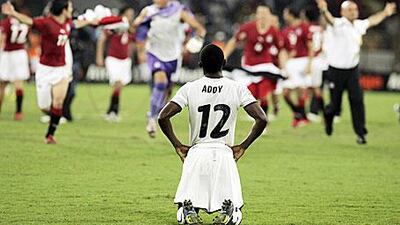LUANDA// After all the concerns about security, what really undermined the tournament was the quality of the football. The final, at least, pitted the best team in the tournament, Egypt, against the second best, Ghana, and, while not exactly thrilling, was at least discernible as high-quality football. But for all the expectation that African sides will be inspired by playing a World Cup on their own continent for the first time, there is a very real possibility that none of the five African qualifiers will make it through the group stage.
Ghana, with their young squad, can take great heart and draw optimism for the future. The main difficulty for their coach Milovan Rajevac is how to re-integrate the more established stars such as Michael Essien, John Mensah and Sulley Muntari, but they have a platform and a method, which is more than can be said of any of the other World Cup sides. Ivory Coast were probably the greatest under performers.
They went into the tournament as favourites, but skulked away in the quarter-finals with fears that their golden generation will remain forever unfulfilled. Their great flaw has always been the lack of a midfield creator, but here they lacked not merely that - Gervinho is not that yet, and may never be - but were also weak defensively and demonstrated an unexpected mental frailty. As their coach Vahid Halilhodzic said mournfully, a team which takes the lead with a minute to go and then concedes does not deserve to succeed.
Their conquerors Algeria, deserved as that victory was, were inconsistent and ill-disciplined. They may have shown great heart - and not a little gamesmanship - to beat Ivory Coast, but their pathetic capitulation against Malawi followed by their disintegration against Egypt hardly speak well of a side hoping to impose themselves in South Africa. Cameroon, the second favourites at the start of the tournament, never got going, and were fortunate to reach the quarter-final, losing to Gabon and then making heavy weather of beating Zambia 3-2 and drawing 2-2 with Tunisia.
Samuel Eto'o, once again, demonstrated that he is a great player only in a great team - his prime asset is the intelligence of his movement, but if the players around him are not good enough to feed him as he takes up good positions, he is neutered, and ends up dropping deeper and deeper in search of possession in areas in which he is ineffective. "We had to look at the young players and see if we could rely on them," said their manager Paul Le Guen. Certainly defensively, it would seem not. Aurelien Chedjou, who replaced the veteran Rigobert Song, seems to have all the faults of the older man - a propensity for gaffes and red cards - and few of the virtues.
Although they finished third, Nigeria were in some ways the worst of any of the World Cup qualifiers. It is hard to know whether to praise their coach Shaibu Amodu for instilling such determination into his side that they progressed despite never really playing well, or whether to criticise him for turning out sides that consisten-tly played such grinding, tedious football. Of their more creative players, only Peter Odemwingie had anything close to a good tournament, although their phalanx of holding midfielders at least gave them defensive resolve.
Amodu was given a target of reaching the semi-finals if he was to stay in charge until the World Cup, but even though he achieved that goal the politics continue between the Nigerian Football Federation and the Presidential Task Force set up to supervise their World Cup campaign, and it remains entirely probable that he will be replaced, with Zambia's Herve Renard reportedly the preferred candidate to take over.
Since 1990 when Cameroon made what seemed the great breakthrough and reached the quarter-final, there have been more Asian teams in the last eight than African. The fear that the underachievement, even in South Africa, may continue is distinct. @Email:sports@thenational.ae

